Previous: MGM’s Hardy Family Series #6: The Hardys Ride High (1939)
All main cast members and even some minor ones return for the July 1939 release Andy Hardy Gets Spring Fever. But this seventh entry in the MGM series is the first of only a few that was not directed by George B. Seitz.
Instead it’s W.S. “Woody” Van Dyke, director of earlier 1930s MGM titles such as the original Tarzan the Ape Man (1932); The Thin Man (1934) and sequels; Powell and Loy just before the first of those movies in Manhattan Melodrama (1934) along with Clark Gable; Gable again, with Jeanette MacDonald, in San Francisco (1936); more MacDonald, with regular partner Nelson Eddy, in Naughty Marietta (1935), Rose Marie (1936) and others; plus several other films including The Devil Is a Sissy (1936) with Andy Hardy himself, Mickey Rooney, featured amongst the cast.
“Once, when the pictures were making so much money they were practically supporting the studio,” Ann Rutherford said regarding Andy Hardy Gets Spring Fever, “they put Woody Van Dyke on one. Woody would print the first take if you got half the words right. But he had never worked with a Hardy film, and when they saw the rushes, it wasn’t a Hardy picture. And they called back George Seitz (for Judge Hardy and Son)” (Eyman 326).There doesn’t appear to be any other reason for Seitz specifically sitting this one out beyond perhaps timing. Seitz directed 6,000 Enemies starring Walter Pidgeon and Rita Johnson, which released just six weeks before Andy Hardy Gets Spring Fever. His next project, Thunder Afloat with Wallace Beery and Chester Morris, entered production just a couple of weeks after Van Dyke’s Andy Hardy film completed. Seitz capped 1939 by returning to the series for the next film, Judge Hardy and Son (1939).
Van Dyke’s Andy Hardy movie is a bit darker than anything Seitz does with the series either before or after. Echoing Ann Rutherford, “it wasn’t a Hardy picture,” at least in tone.
Seventeen year old Andy is worked up throughout over a crush on Carvel High’s attractive new dramatics instructor, Rose Meredith (Helen Gilbert). Andy drops his usual frenetic pace and immature exclamations in order to spend a good portion of Andy Hardy Gets Spring Fever lovelorn and skulking in the dark.
Never has Mickey Rooney worn so many different expressions as Andy Hardy in this entry which, as it turns out, was well-timed with his character’s latter adolescence.
With Boys Town behind him in 1938 and the Hardy series in full swing Mickey Rooney had already earned a special Juvenile Oscar earlier in 1939, the first of three consecutive years in which he emerged as Hollywood’s top box office star.

A more mature Andy Hardy with Mickey Rooney at the center and, left to right around him: Lewis Stone, Fay Holden, Sara Haden (standing), and Cecilia Parker
MGM kept their valuable property mighty busy. Andy Hardy Gets Spring Fever was one of three Hardy films released in 1939, a year which saw Rooney begin by completing work on The Adventures of Huckleberry Finn and The Hardys Ride High before starting in Andy Hardy Gets Spring Fever. Less than two weeks after completion of work on Spring Fever Rooney began Babes in Arms with past and future Hardy co-star Judy Garland.
Rooney begins Andy Hardy Gets Spring Fever every bit as unrestrained as we’ve come to expect of his Andy. He hurdles a roadblock yipping his way to Polly Benedict’s (Ann Rutherford) house to undoubtedly thrill her with his latest boyish exploits, but smacks right into another type of roadblock upon reaching Polly. She is entertaining the latest in her growing line of more mature suitors, a U.S. Navy lieutenant present in Carvel to help supervise the very road construction responsible for that physical roadblock Andy had leaped on his way over.
Andy Hardy turns brat over the incident. He stomps home, kicks dirt, pops off to his mother and sits sullen at the dinner table not touching a bite. That evening he sneaks out of the house and, in the first of a great number of scenes set in the nighttime, perches himself in a tree to spy on Polly and her gentleman friend from afar.
Andy seems far from the most popular kid in Carvel the next day in school as he mopes at his desk, totally in his own world until Polly passes him a note telling him not to bother her anymore. He flips the paper over and begins writing what was surely a none too pleasant reply while the Principal (John Dilson) introduces a new teacher to the class.
Miss Meredith’s silky voice changes Andy’s world. He forgets his note, forgets Polly even, and goes back to his own place, only this time he wears a look of ecstasy so disconcerting that Miss Meredith is visually frazzled when she finally makes eye contact with him.
Andy Hardy is now fully infected with Spring Fever and only his new dramatics teacher has the cure!
Helen Gilbert plays Miss Meredith in, to my surprise, her film debut. The nearly 24-year-old actress had been under MGM employ for some time though as a cellist in the studio’s recording orchestra headed by Herbert Stothart.
Stothart had discovered the pretty young cellist when she played the Hollywood Bowl, the first of what the newspapers reported as a long line of discoveries (She was in turn discovered by Van Dyke for this film). Gilbert had a musical background said to originate as a child in her father’s music store. She was by this point married to Columbia studio’s assistant musical director, Mischa Bakaleinikoff, the first of her six marriages through 1952 (Her collection of husbands also included Johnny Stompanato).
After her Andy Hardy debut Gilbert next appeared in a Dr. Kildare film before Winfield Sheehan cast her opposite Robert Young in Florian (1940). After Florian “something happened,” to use Louella Parsons words, and MGM let Gilbert go. She was in between her first and second marriages at this time and mentioned in newspapers as accompanying Kildare co-star Lew Ayres around town. A year later Paramount signed her but Gilbert’s movie career flamed out by the mid-40s.
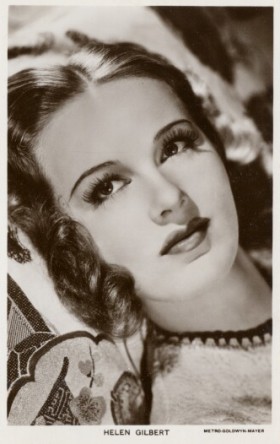 To give an idea of Helen Gilbert’s charms I quote Florian producer Sheehan, who explained his casting choice as follows: “There were eight reasons for her selection: Unusual personality, beauty of expression, rich, melodious voice, small stature, charm and education, sensitive dignity, expressive eyes and the shape of head that sculptors select” (Tildesley).
To give an idea of Helen Gilbert’s charms I quote Florian producer Sheehan, who explained his casting choice as follows: “There were eight reasons for her selection: Unusual personality, beauty of expression, rich, melodious voice, small stature, charm and education, sensitive dignity, expressive eyes and the shape of head that sculptors select” (Tildesley).
She was quite beautiful, too beautiful for the orchestra it was reported at the time of her discovery for the Andy Hardy film. But before Andy even saw her it was the voice that snapped him out of his misery. Columnist Paul Harrison put it best when writing that Gilbert “speaks in the the register of a torch-singer.” Her voice is deep and I’ll repeat myself to once more call it silky.
“If you don’t mind my saying, I think you’ve got a swell voice,” Andy says moments after introducing himself to Miss Meredith. It didn’t come natural, the schoolteacher tells him, “I studied very hard. I think a pleasant voice is so important, don’t you?”
Mickey Rooney will play with his own voice throughout Andy Hardy Gets Spring Fever adapting what Andy certainly imagines as the voice of the sophisticate. Or in Andy’s words from past entries, a “fancy pants.”
Miss Meredith’s main assignment at Carvel High is overseeing the annual play which she has decided to base upon the best student submission. Between Polly’s having thrown him over and his desire to impress Miss Meredith, Andy has double motivation to crank out a quality piece of work and sure enough his “Adrift in Tahiti” will be selected by Miss Meredith to be performed by the class.
Basing his work on Romeo and Juliet but moving the action to Tahiti where his Navy Rear Admiral is jilted by Polly’s Tahitian Princess, Andy comments that, “I think my new ending is a lot better than Shakespeare’s. It’s more spiritual.”
That ending sees him gain vengeance over Polly by having her throw herself into a flaming volcano operated by Andy’s pal Beezy (George P. Breakston) after Andy, in the lead, tells her off but good.
Andy gets to use his new voice, one which sister Marian (Cecilia Parker) describes as “sounding like molasses dripping down stairs,” during rehearsals of “Adrift in Tahiti.” But both Andy’s modulated voice and decorative mustache have to go by the time of the actual performance.
From the moment he met her complicated feelings emerge from Andy towards Miss Meredith. She gently scolds him when he calls her by her first name, Rose, in private conversation. He talks about her too much around the house, enough for Judge Hardy to notice. Then one day Andy stays behind as class ends but Miss Meredith is unaware that she isn’t alone. She turns out the lights and strides to the window where she cries under the moonlight. Andy announces himself, startling her.
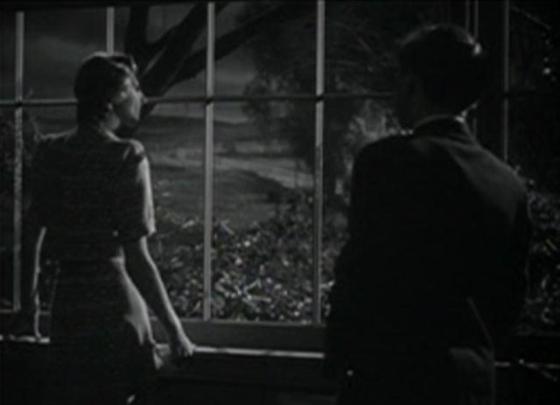
A very un-Hardy scene in the dark. Helen Gilbert cries at the window as a concerned Mickey Rooney approaches.
“I’ve never seen a woman cry before … Why, it’s terrible,” he says. He asks her what’s wrong. “I just want to know because I like you so much.”
“Andy!” she says. She has him sit down. “Andy, you know you’re skating on dangerous ground.” The conversation is awkward and Miss Meredith eventually closes it by stating, “Neither one of us must step over that line of teacher-student. Though that doesn’t mean we can’t be friends.”
She shouldn’t have left him that opening. Miss Meredith continues to attract Andy through her kindness and constant quoting of romantic lines from Shakespeare. He catches her after class one day and manages to get her consent to walk her home. Upon arriving he works his way up to proposing marriage.
Yes, that happened.
Miss Meredith knows that Andy, as Judge Hardy eventually puts it to her, “worships at your shrine,” but tries too hard to let him down easy. For seventeen year old Andy failure to completely kill his notions of love is taken as encouragement. The problem, and Andy does not know this, is that Miss Meredith is deeply in love herself. Just not with Mr. Andrew Hardy.
“They say happiness is contagious and I’m hoping mine will spread,” Miss Meredith tells Polly just before the curtain rises on “Adrift in Tahiti.”
Andy doesn’t discover the reason for Miss Meredith’s happiness until just before the third act of his play.
When he does he is first stunned, then angry, and he carries those emotions onto the Carvel High stage where Rooney does his finest acting of the series looking past Ann Rutherford into Helen Gilbert’s eyes, tearing his former love to pieces with his every word. We’ve heard those words before during rehearsal as they are the very ones Andy had originally scripted for his play and every one now applies to Miss Meredith.
Unfortunately this Hardy family film can’t end there. The eighth entry in the series looms after this one and Andy can’t be left in an angry limbo.
While the resolution begins well with Andy having skulked off into the darkness once more to sit outside Miss Meredith’s house it ends kind of clumsily with a cork capped back on all of Andy’s newly found teenage angst and his spirits lifted by Miss Meredith’s reassurances of a dozen more women coming his way mighty soon. It’s not a total disaster, but this conversation seems forced compared to some of the uncharacteristically real dialogue of earlier.
I don’t think we would have seen this other side of Andy Hardy had this been another Seitz movie. Oh, the crush would have been there, that’s what this story is, but since Seitz’s Andy never seemed to get down for more than moment or two I don’t expect there would have been this extended view of the Andy that Andy Hardy would never want us to see.
And all of that darkness—any of Spring Fever’s nighttime scenes could have just as easily been set in the sunlight. Likely they would have been with a few more woo woo’s and physical clicks of Andy’s heels. Instead:
No, barring A Family Affair at the very beginning, this is the most unusual of the Hardy family films. While A Family Affair may have been dark, young Andy Hardy remained light. In Andy Hardy Gets Spring Fever Andy abandons all of his cockiness. He’s just not the Andy we’ve known and will continue to know. But given his age it still works.
Despite centering on this very different Andy, and there’s his name back in the title again even, Andy Hardy Gets Spring Fever still manages to keep much of the fun Hardy spirit because of the other family members. Most especially in this case Lewis Stone’s Judge Hardy and, to a lesser degree, Cecilia Parker’s Marian.
Judge Hardy is going to be taken on his own ride in Andy Hardy Gets Spring Fever. His bailiff, trusty Erville Alderson (who appears in nine Hardy films himself), informs the Judge that taxes are due again on that old aqueduct property that keeps popping up ever since A Family Affair. The Judge says the tax bill is, “like buying hay for a dead horse,” the property having served its purpose several movies back.

That’s Erville Alderson as Judge Hardy’s trusty bailiff at the start of this and several other Hardy movies.
But Alderson’s bailiff also tells the Judge he has a couple of visitors. Two businessmen, Willit (Stanley Andrews) and Hansen (Byron Foulger) come to explain that the very aqueduct property he’s just been wringing his hands over is worth money because of the aluminum bauxite found in the soil.
The Judge, so energized by the good news that he even puts off dinner to speed-mow the lawn, soon has all of his Carvel cronies, most notably Polly’s Dad, George Benedict (Addison Richards in the first of four Hardy appearances), investing in the Carvel Aluminum Corporation with him.
Meanwhile daughter Marian has been thinking: “I know coming from me that sounds impossible, but honest it’s true.” Her life has become kind of pointless and she was wondering if the Judge could find her a job.
“Well, I’d like to know you could earn your living in case you had to, but I’d hate to see you take somebody else’s paycheck who might need it pretty bad,” the Judge tells her.
After all, there’s little doubt that Marian is in housewife training so she can one day be just like mother Emily (Fay Holden), but she hasn’t had a serious suitor for a few Hardy entries now and so a future more along the lines of Aunt Milly (Sara Haden) may loom.
Marian is soon put to work as Willit and Hansen’s secretary at the Aluminum Corporation, her salary paid on the sly courtesy of Judge Hardy.

Even the Judge and Emily Hardy find themselves in the dark during ANDY HARDY GETS SPRING FEVER. But Mother Hardy isn’t getting down: “Darkest before the dawn, honey,” she tells her husband.
Andy, despite being the focus of this film, never comes into contact with the Aluminum Corporation and what will develop into Judge Hardy’s own dilemma. The Judge for his part has worries over not only his swindling by Willit and Hansen but Andy’s obvious growing problem. Both problems peak at once with Andy finally sitting down to tell the Judge that he’s going to leave school, forget about college and get married.
“Don’t you be trapped into being an adult, you grow into it,” the Judge suggests during this latest man-to-man.
“Dad, I guess this is one time you and me, we can’t hear each other,” Andy replies.
It’s okay, the Judge assures him: “We know each other’s there.”
 Andy Hardy Gets Spring Fever is the seventh film in the Hardy Family series and was directed by W.S. Van Dyke. It was the first Hardy entry not directed by George B. Seitz. The original screenplay was by Kay Van Riper and Aurania Rouverol’s 1928 play Skidding continues to provide the basis for the Hardy Family characters.
Andy Hardy Gets Spring Fever is the seventh film in the Hardy Family series and was directed by W.S. Van Dyke. It was the first Hardy entry not directed by George B. Seitz. The original screenplay was by Kay Van Riper and Aurania Rouverol’s 1928 play Skidding continues to provide the basis for the Hardy Family characters.
Andy Hardy Gets Spring Fever has yet to be released on DVD but it has had a prior VHS release and is currently available to rent or buy as a download or streaming video
through Amazon Instant Video. The title also airs on Turner Classic Movies with it’s next showing coming this Christmas night at 9:45 pm EST.
Coming next: MGM’s Hardy Family Series #8 – Judge Hardy and Son (1939)
Sources
- Eyman, Scott. Lion of Hollywood: The Life and Legend of Louis B. Mayer
. New York: Simon & Schuster, 2005.
- Harrison, Paul. ”Harrison Turns Hollywood Spotlight on Three New Faces Facing Cameras.” Ogden Standard Examiner 22 May 1939. NewspaperArchive. Web. 19 Dec 2012.
- Tildesley, Alice L. ”What Makes a Movie Star?” Oakland Tribune 18 Feb 1940: 152. NewspaperArchive. Web. 19 Dec 2012.

ANDY HARDY GETS SPRING FEVER advertisement from the Mason City Globe Gazette, July 28, 1939, page 10.
[phpbaysidebar title=”eBay Shopping” keywords=”Mickey Rooney,Helen Gilbert,Ann Rutherford” num=”5″ siteid=”1″ category=”45100″ sort=”EndTimeSoonest” minprice=”49″ maxprice=”599″ id=”2″]





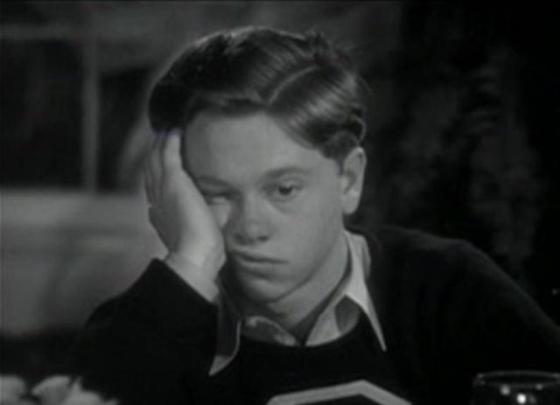




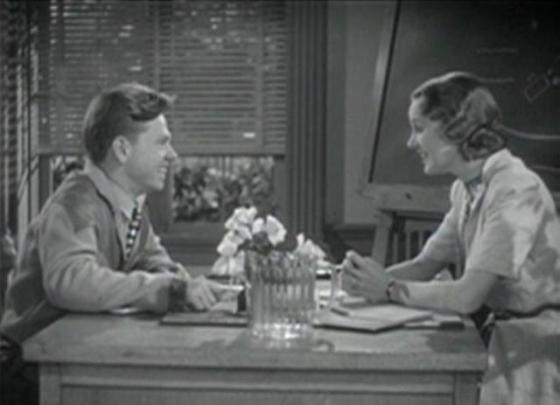







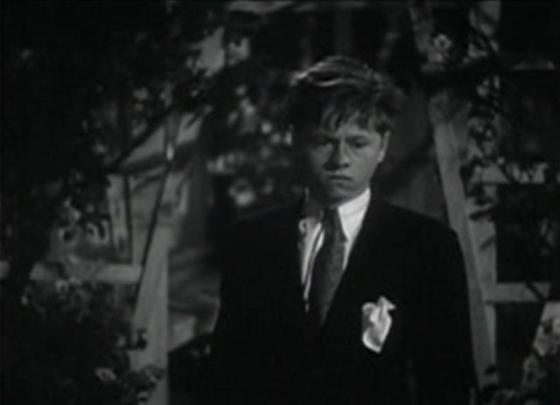






I didn’t realize there were THREE Andy Hardy movies in 1939! MGM sure kept Mickey Rooney on a busy schedule.
R.A., 3 in each 1938 and ’39! That’s 6 over 2 calendar years plus 7 other titles for Rooney including BOYS TOWN, STABLEMATES, THE ADVENTURES OF HUCKLEBERRY FINN and BABES IN ARMS. MGM definitely knew how to cash in!
Great write up on one of my favorite Hollywood series- along with the Road pics. Very informative, you really did your homework! Thank you!
Thanks, Rick, I’m glad you enjoyed it! At the time I had planned to cover all of the Hardy entries, but I wound up stalling out about halfway through. Might pick it back up again someday though as they’re a favorite of mine as well. Thanks again!